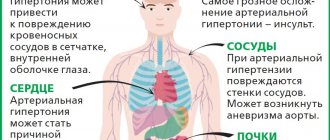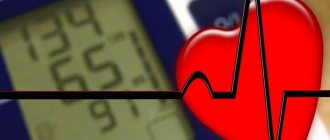High blood pressure (hypertension) is a common health problem that affects millions of people around the world. Obesity is also an important public health problem, with its high prevalence and associated risk of cardiovascular disease, diabetes, and kidney disease.
Research has shown that by 2025, about 1.56 billion people worldwide will suffer from high blood pressure. This is 60% more than in 2000. The forecast predicts an epidemic of cardiovascular disease as high blood pressure affects the heart as well as blood vessels, leading to severe damage to various organs such as the kidneys and eyes.
Obesity and high blood pressure
The content of the article
Research has shown that the rise in people suffering from high blood pressure is seen in conjunction with a sharp increase in the prevalence of overweight and obesity. According to the International Obesity Task Force, at least 1.1 billion adults are currently overweight, including 312 million who are obese.
Similar trends are observed in the United States and Europe. For example, in England, 66% of men and 55% of women are overweight or obese.
Safe ways to lose weight with hypertension
Excess weight and hypertension often exist together. In order to lower blood pressure, hypertensive patients need to lose weight. But this must be done wisely, without causing further harm. We must take into account the fact that obesity can be caused not only by excessive consumption of high-calorie foods, but also by metabolic disorders. Iodine deficiency in the body can lead to such disorders. In this case, diets alone will not be enough. To normalize a person’s condition in this case, it is necessary to fill the missing element.
You can lose weight with hypertension using an integrated approach:
- dosed physical activity is required;
- taking vitamin supplements;
- rejection of bad habits;
- dietary food.
Tips for proper nutrition to help you safely lose weight if you are overweight and have high blood pressure:
- reduce consumption of salty foods;
- exclude products made from flour, sweets, and fatty foods;
- drink enough water (up to 1.5-2 liters per day);
- calories consumed should not exceed energy consumed;
- practice frequent meals in small portions;
- do not overeat at night (the last meal should be no later than six to seven o’clock in the evening).
- the diet should be dominated by protein, cereals, vegetable oil, vegetables, herbs, fruits (not sweet), rye bread, fish, fat-free meat, low-fat dairy products and foods rich in fiber;
- with high blood pressure, strict diets and hunger strikes are unacceptable;
- steam, boil, stew, avoid fried foods;
- It is useful to include ingredients rich in potassium and magnesium in your dishes (parsley, nuts, carrots, walnuts, beets, dried apricots, cabbage);
- If you have hypertension, you need to lose weight slowly, without jerks; it’s good if a person consumes 500 calories less every day; during the first 6 months, weight loss of 10% of the initial values is considered optimal; in this case, the person losing weight does not risk regaining the lost kilograms immediately after finishing the diet;
- It is recommended to regularly arrange fasting days against the backdrop of a balanced healthy diet for the rest of the time (once a week), for example, eat one cottage cheese, only apples, only lean meat with a vegetable side dish or only jacket potatoes without salt, drink only kefir.
Excess weight is a provocateur of many diseases. Hypertension is just one of them. Poor condition of blood vessels, disruption of the heart, high blood pressure - these are the possible results of excessive obesity. In addition, obesity is fraught with serious complications that threaten a person’s life, so everyone should monitor their weight, especially people with high blood pressure. Proper nutrition and an active lifestyle will help you lose weight with hypertension and maintain an optimal weight.
Obesity and heart disease
Obesity is associated with several heart diseases, including coronary artery disease, heart failure, type 2 diabetes, and high blood pressure.
High blood pressure
Approximately 60% of all diabetics are overweight. Further abdominal obesity causes a higher risk due to the high rate of fatty acids and hormones entering the liver from fat deposits in the abdominal cavity.
Accordingly, waist circumference and waist-to-hip ratio are surrogate markers of abdominal or visceral obesity and may more accurately predict heart attacks, heart disease, and diabetes than body mass index (BMI).
In addition to the link between obesity and high blood pressure, the co-occurrence of both conditions together also creates a significant economic burden on society.
Data from the most recent National Health and Nutrition Examination Survey (NHANES) for 1999–2000. Shows that although blood pressure control rates have improved much since 1988 from 25% to 31%, they are still low. This resulted in 39,702 cardiovascular events, 8,734 cardiovascular deaths, and $964 million in direct medical costs in the United States. In Europe, these figures are 1.26 billion euros due to the lack of adequate pressure control.
When should action be taken?
The more weight a person has, the more seriously the internal organs are deformed, the more time it takes for treatment and recovery. If obesity of types 1 and 2 can be helped by diets and recommendations chosen by the attending physician, moderate physical activity, and treatment of concomitant diseases caused by obesity, then obesity of degrees 3 and 4 often requires surgical intervention. Today, gastric surgeries such as gastric banding, gastric bypass, and gastroplasty are very popular. To avoid resorting to such radical methods, you should start treating the disease at earlier stages. Among other things, there are many folk remedies that supposedly help in the fight against obesity, for example, taking activated carbon, soda or vinegar, as well as the method of treating obesity with leeches or acupuncture. But are these methods safe and effective? If you have already tried all the ways to lose weight and are almost desperate, then there is another win-win option - obesity coding. Obesity coding does not mean that after the session you will be able to eat as much as you want and you will not gain weight. After one hypnosis session conducted by a professional psychotherapist, you yourself will refuse to eat, you will not have such a strong appetite as before. Food will no longer be the center of your attention, you will notice other delights of this world. If you still have doubts, then find out more about the method of coding for excess weight.
High blood pressure and fat distribution
In addition, the association with high blood pressure is also present when considering the distribution of body fat in obesity. Abdominal obesity has been associated in studies with hypertension.
For example, a study of normative aging found that in men over 18 years of age, the risk of hypertension increased by about three times for every one unit change in the abdominal circumference to hip width ratio.
The Framingham Heart Study found that a 5% increase in weight increases the risk of hypertension by 30% over 4 years. However, weight loss reduces both systolic and diastolic blood pressure.
Dangers
Obesity is a serious disease that is a disruption of metabolic processes. Excess weight reduces life expectancy.
In hypertension, the fight against fat deposits is included in both treatment and prevention. And this should be taken very seriously, since excess weight in combination with hypertension can cause significant harm to the body.
- With an unhealthy diet, the body receives a lot of high-calorie foods containing large amounts of cholesterol. Its excess in the blood begins to accumulate on the walls of blood vessels and harden over time. This process leads to the formation of cholesterol plaques, which do not allow the blood to move in a normal working rhythm. And the pressure tends to rise at this moment. Also, the vessels lose their elasticity and become very fragile.
- There is a high risk of blood clots that block blood flow, causing severe hypertension and the possibility of developing a hypertensive crisis.
- Atherosclerotic plaques can block coronary arteries, causing a stroke.
Such complications can occur with elevated levels of cholesterol, which enters the body with fatty and high-calorie foods. In combination with insufficient physical activity, smoking, and alcohol consumption, heart overload can occur, which contributes to the development of myocardial infarction.
Determination of excess body weight
You can determine that you have extra pounds in different ways. The ideal weight is one at which a person feels good and organs and systems work in the right mode. It is possible to determine that body weight is normal by the following indicators:
- For women, it is necessary to take into account waist size. It is always narrower than that of men, so its increase may indicate that it is worth getting rid of a few kilograms. For any body type, the waist should not be more than 88 cm. If the figure is higher than normal, then hypertension is often diagnosed.
- For representatives of both sexes, the problem can be determined using a special formula: divide the weight in kilograms by two measurements of height in meters. If the result is more than 25 kilograms per square meter, it means that you are overweight, and if the result is more than 30, the patient is diagnosed with obesity.
Diet
A diet for hypertension does not imply “hungry” days and strict restrictions on the number of calories or food products.
The diet includes several simple rules:
- avoiding fatty and fried foods rich in bad cholesterol, which constricts blood vessels. This way you can reduce the risk of stroke or heart attack;
- do not eat after 18-00. The stomach will have time to digest food before the morning, so you can enjoy deep sleep and feel much better the next day;
- giving up nicotine and alcohol. They put extra stress on the vessels, which does not have the best effect on the condition of the vascular system;
- give preference to cereals, vegetables, fruits. It is also allowed to eat lean boiled or steamed meat in small quantities;
- moderate your salt intake. Avoid pickles and try to salt your food less. Salt retains fluid in the tissues, which can cause swelling.
Why are extra pounds dangerous?
Doctors from different countries focus their patients’ attention on the importance of maintaining weight within normal limits. After all, obesity has reached epidemic proportions over the past 20 years. The problem affected not only adults, but also children. World Health Organization experts say that more than a million people on the planet are obese.
This metabolic pathology annually causes the death of half a million Americans and about 300 thousand Europeans. It is known that carrying an extra 4.5 kg increases the risk of premature death by 8%. For people whose body weight is 20 kg higher than normal, the risk of dying earlier doubles.
Problems with excess weight, in addition to hypertension, can provoke many diseases, among which the most common are:
- impaired glucose tolerance (diabetes mellitus type II);
- fatty myocardial hypertrophy;
- stroke;
- malignant tumors of the breast, ovaries, prostate, pancreas;
- disruption of the gallbladder.
Excess weight provokes dysfunction of the reproductive organs due to changes in hormonal levels. In women, testosterone levels increase; in men, on the contrary, the production of this substance decreases. The result is a disruption of the monthly cycle, impotence, and other pathological conditions.
The additional load created by extra pounds leads to disorders of the musculoskeletal system. Most obese people have osteoarthritis. Joint pain increases with movement, which makes obese people move even less - the problem gets worse.
But the most dangerous complication that accompanies gaining extra pounds is hypertension. In people of heavy build, the influence of high blood pressure, combined with excess adipose tissue, is the main factor in the occurrence of heart disease.
Stroke
Physical exercise
To prevent the lost kilos from returning again, you should add physical exercise to your diet. People with hypertension need to select all exercises very carefully, because a strong load will have a great impact on the heart and the pressure can rise sharply. That is why all selected exercises should not cause much stress on the body.
The duration of classes at the very beginning should not be long, so you can stop at fifteen minutes a day. Thus, the patient’s heart will get used to small loads, which can later be increased. The training time can be increased every fourteen days by five minutes. You need to walk up to one hour. However, the number of classes should also be increased to six times a week.
You should do exercises constantly, this is the only way to get rid of unnecessary pounds and high blood pressure.
It is better to start your exercises with walking, later you can start doing stretching. The third week can be devoted to exercise cycling and aerobics for beginners.
But when performing, you should carefully listen to your body; if dizziness or rapid heartbeat appears, then the pace should be reduced.
After performing the exercises, you need to measure your blood pressure and report the readings to your doctor. This will help him adjust the course of therapy.
Remember, excess weight has a negative impact on the functioning of the cardiovascular system. In addition to cosmetic problems, various serious pathologies appear. Try to always be in shape so that you can be a healthy and beautiful person all your life.
How do extra pounds affect blood pressure?
Scientists are still figuring out how hypertension and excess weight are related. But it is known that the accumulation of excess fatty tissue disrupts the synthesis of hormones and a breakdown occurs at the metabolic level.
The most vulnerable chain in obesity is the renin-angiotensin-aldosterone chain. These biologically active substances are responsible for increasing blood pressure.
See also Calculation of mean arterial pressure
Renin is produced by the kidneys. When fat accumulates, the functioning of the filter organ is disrupted, and enzyme synthesis is activated. In the bloodstream, renin acts on angiotensin, converting it from inactive to active. The resulting substance promotes vasoconstriction. The adrenal glands, under the influence of large doses of renin, synthesize excess aldosterone. It affects the exchange of potassium and sodium ions. The result of the described biochemical reactions is an increase in blood pressure.
When examining obese individuals, a decrease in the amount of high-density lipoproteins (good cholesterol) and an increase in the content of low-density organic compounds (bad cholesterol) are noted in their blood. A change in the ratio leads to atherosclerosis. With this pathology, the elasticity of the vascular walls deteriorates and the capacity of the arteries decreases.
Sample menu for high blood pressure
The daily menu consists of standard breakfast, lunch and dinner. Between each main meal, a small light snack of fruit or salad is acceptable. Composition of the daily menu:
- breakfast - ¾ cup cereal, a glass of low-fat milk, a slice of whole grain bread, 200 grams of orange juice;
- lunch - fresh vegetable salad, lean boiled chicken, no more than 200 grams of side dish or vegetable soup;
- 60 grams of lean beef, beans with vegetable oil, 1 potato, 1 apple, 200 grams of low-fat milk.
The diet should not exceed the daily calorie intake. When cooking, you should avoid frying methods with oil. It is recommended to prepare food by stewing or boiling, which will reduce the calorie content of the food and retain more vitamins and nutrients in the food.
Why does obese people have high blood pressure?
Excess weight and blood pressure are interconnected things. Increased resistance to blood flow in the walls of capillaries occurs in four cases:
- Due to a significant increase in the volume of blood that is driven through the vessels;
- Due to a change in the condition of the blood, when it becomes too viscous;
- When vessels lose their elasticity, their self-regulatory capabilities are impaired;
- After narrowing of the lumen of the vessel, complicating blood transport.











